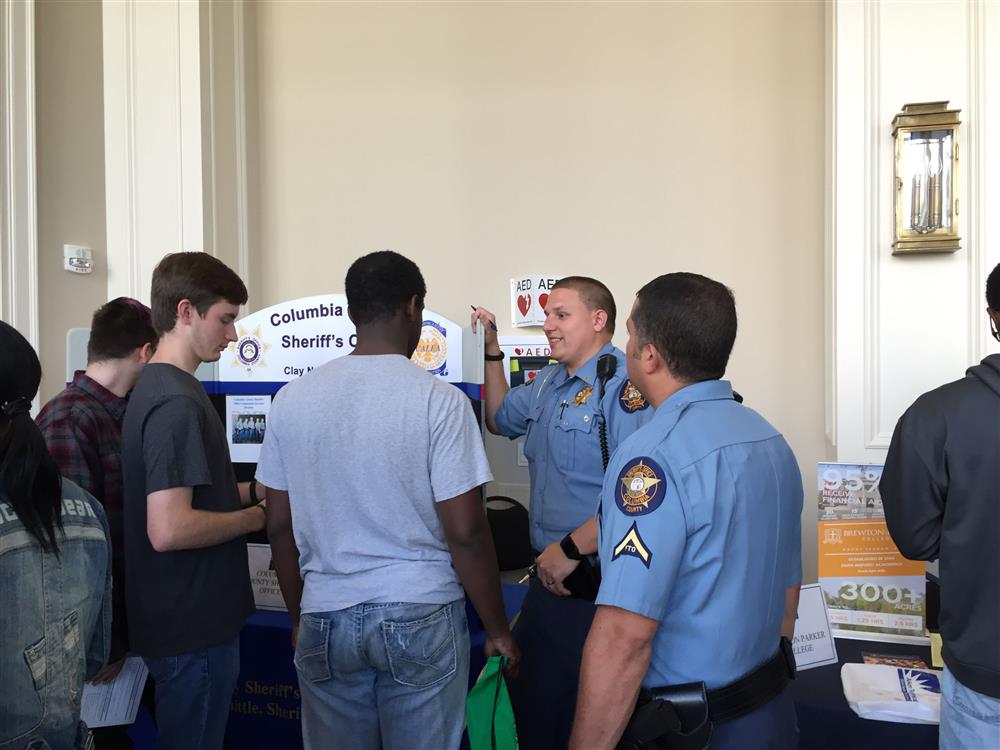Providing a variety of career services for high school students with disabilities
- Solution
- Georgia’s High School/High Tech (HSHT) programme
- Organization
- Georgia Committee for the Employment of Persons with Disabilities, Inc.
- Country of Implementation
- United States of America
- Region
- North America
- Start Year
- 1998
- First published
- 31.01.2017

Solution details
People
“The HSHT programme gave me the resources and support I needed to navigate my path through college and on to success.” Ms. Kayla Wilson, Accounting Manager, Sherman & Hemstreet
The mission of the Georgia Committee on Employment of People with Disabilities, Inc. is to provide information, programmes, and transition activities designed to enhance equal opportunities for young people with all kinds of disabilities. Now in its 18th year, HSHT has served over 10,000 high school students with disabilities and is currently serving 86 high schools in 48 counties of Georgia. .
Problems Targeted
The state of Georgia has the third lowest graduation rate in the United States for students with disabilities, at just 36.5 per cent compared to the nationwide average of 78.8 per cent. Georgia High School/High Tech addresses the needs of these students by providing them with the tools to transition from “learning to earning.”
Solution, Innovation and Impact
Georgia's High School/High Tech (HSHT) programme is a collaboration of the Georgia Committee on Employment of Persons with Disabilities, Inc., the Georgia State Vocational Rehabilitation Program agency, and local school systems. It offers high school students with disabilities (aged 16 to 21) comprehensive, community-based exposure to academic and career services such as: · Mentoring · Industry tours · Work internships · College fairs · Family engagement HSHT collaborates with government agencies, school systems, non-profit and community organizations, and companies to provide these services. In 2015, students had a graduation rate of 88 per cent.
Funding, Outlook and Transferability
Each year the HSHT programme receives a contract from the State of Georgia Vocational Rehabilitation Program, which in 2016 is for US$486,000. The average cost per student is US$385 to cover the costs of field trips, laptops, assistive technology, and technical assistance to high schools that want to know how to set up and operate a programme. The vision of HSHT is to have one programme in each of Georgia’s 159 counties, and to engage graduates as persons who can contribute to society in paid positions. One programme graduate currently serves as an HSHT board member.
Media
Life Story
THE STORY OF KAYLA WILSON, ACCOUNTING MANAGER
“I have a college degree and a successful career in accounting.”
My name is Kayla Wilson and I have a learning disability. I confess I have not always embraced my disability. During elementary and middle school I really struggled with learning to spell, with multiplication tables, and with being able to read in class. My classmates noticed that I did not understand things the way that they did and made fun of me. I did not know why I was different; it was very confusing and I had very low self-esteem. In the seventh grade my parents had me tested and observed, and that’s when I was diagnosed with a specific learning ability that affects my reading and writing skills. As a result, I was given accommodations to assist me with test taking and I started doing much better in school. In high school the classes were harder and I still struggled. Fortunately, I had a strong support system with my parents, and I started participating in Georgia’s High School/High Tech (HSHT) programme. In my junior year I participated in a HSHT Youth Leadership Forum, where I made many friends and found a great many other people who were experiencing the same struggles that I faced. The speakers at the forum were amazing. They embraced their disabilities, shared their difficult journeys to success, and were so inspiring. This forum was life changing for me! It was at this moment when I started believing in myself. I graduated high school and went on to college, where I had to advocate for my own accommodations for my classes and no one noticed or cared that I had a disability. Now I have a college degree and a successful career in accounting. In fact, in 2013 the Governor of Georgia asked me to serve on the Georgia State Rehabilitation Council.
Related information
- Connections
- 1
-
Organization